In This Episode << SLIDE LEFT TO SEE ADDITIONAL SEGMENTS
Young Clergy Shortage
LUCKY SEVERSON, guest host: Mainline Protestant churches have long had a problem of shrinking congregations. Their efforts to put more people in the pews also face another disturbing trend – the shortage of young clergy to lead those congregations and to attract more young members. Judy Valente reports.
JUDY VALENTE: From the time she was 13 years old, Jennifer Smith knew she wanted to be a Methodist minister.
JENNIFER SMITH (Graduate, Drew University School of Theology, Madison, NJ): I saw that I really had a passion for preaching and for reaching out to others and doing mission trips and things like that. So I really began to zero in and see that I was called to the local church.
VALENTE: On this day, the 25-year-old Smith will take a big step toward realizing her dream, graduating summa cum laude from Drew University’s School of Theology in Madison, New Jersey. But Smith and others her age are a distinct minority at many seminaries.
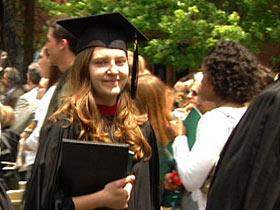
Ms. SMITH: You picture “pastor” and you picture this sort of, you know, old man or something like that in the clerical garb. And you might not even think that’s an option. I didn’t even realize that women could be pastors either until I was in late high school.
VALENTE: The Reverend Lovett Weems of Wesley Theological Seminary in Washington, D.C., documented the declining numbers of young clergy in mainline Protestant denominations.
The Reverend LOVETT WEEMS (Wesley Theological Seminary, Washington D.C.): Churches that have been in decline for decades are not a compelling magnet to draw energetic, passionate younger persons to commit their lives to a vocation of ministry.
VALENTE: Only about five percent of mainline Protestant pastors are under the age of 35 – a dramatic drop from 20 years ago. Church leaders say having young, energetic pastors is essential to the future vibrancy of the church.
The Reverend ANN SVENNUGSEN (Fund for Theological Education, Atlanta, GA): They do bring a life and an energy that is inspiring to a whole congregation. They also, in many cases, lift up the congregation’s sense of its own vocation of helping to mentor young pastors.
VALENTE: The Reverend Kurt Levensaler is an Episcopal priest in his early 30s. He says long working hours, starting salaries as low as $20,000 to $30,000 a year, and the stress on a minister’s family are among the reasons young people shy away from this vocation.
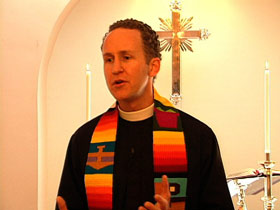
The Reverend KURT LEVENSALER (Christ Church, Alexandria, VA): Ordained ministry requires a high level of commitment across one’s life, and in this day and age, in my generation we’ve almost elevated our personal choice to the level of God, and so that sense of commitment that’s required, I think, is one of the obstacles.
VALENTE: Moreover, only about half of those who graduate from seminary actually go on to work in parish ministry. They pursue careers in social services, chaplaincy or teaching. Twenty-six-year-old Joshua Wall won an award at Drew for his New Testament scholarship. But he doesn’t think he’d do well as a pastor. He’s decided to teach.
JOSHUA WALL (Graduate, Drew University School of Theology, Madison, NJ): I feel like often the church holds onto what it’s done in the past because that’s what it’s always done, even when it doesn’t make sense or it doesn’t translate into today’s society. I work a lot with youth, and so it’s hard to explain to youth that, you know, the song’s important because it’s 800 years old. That’s great, but when they are bored to tears by it, and I’m bored as well, it’s hard to look at that and understand how they’re supposed to relate to it.
MAXINE BEACH (Dean, Drew University School of Theology, Madison, NJ): A lot of young 20-year-olds really believe that they can probably make more of a difference someplace else, that churches have become comfortable. They’ve become places that are interested in their own survival, and a lot of 20- to 25-year-olds, 30-year-old people do not want to buy into that dynamic. They want a place where they really believe that Jesus can be real and new.
VALENTE: Church leaders are banding together across denominational lines to encourage more young people to consider ministry. The Reverend Ann Svennungsen directs the Atlanta-based Fund for Theological Education.
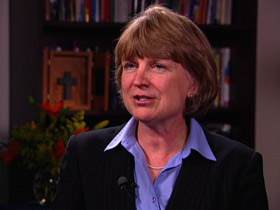
The Reverend SVENNUNGSEN: We support them financially. We support them with a network of mentors and peers. We help them to imagine the goodness of this work.
VALENTE: The Lilly Endowment is funding a mentoring program that pairs senior pastors with younger ministers. At historic Christ Church in Alexandria, Virginia, an Episcopal parish, seminary graduates learn what it takes to lead a congregation before being sent out on their own.
The Reverend LESLIE CHADWICK (Christ Church, Alexandria, VA): It’s been great to be in a parish with such a variety of experience. I’ve gotten to do funerals and weddings and special services, and it’s a privilege to be with people at those moments.
VALENTE: The church’s pastors get together to offer advice and suggestions on giving sermons. Christ Church pastor Carol Pinkham Oak believes more young people would consider ministry – and stay in it – if only they were encouraged.
The Reverend CAROL PINKHAM OAK (Pastor, Christ Church, Alexandria, VA): We can, as clergy, talk more about the joys that we know in the pastoral life. We tend not to do that, and I think if we were more vocal about this is a difficult vocation, but it’s also a wonderful vocation, that that would open up for other people the possibility of considering if they’re called to ministry.
VALENTE: Sheila Beckwith, who is 35, is graduating from Drew’s School of Theology. She felt called to ministry as a young adult, but was afraid to respond, and no one encouraged her.
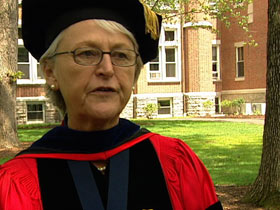
SHEILA BECKWITH (Graduate, Drew University School of Theology, Madison, NJ): I had no one in the church to really talk to about my issues. It was just, “Believe in God and God will make the way.” That wasn’t enough for me. So that turned me off from the church. And I went back in my later 20s, because I found God for myself.
VALENTE: Others say there needs to be more fundamental change within the church itself.
Dean BEACH: I know some horror stories of our young ones who went out, started alternative services in churches, and the senior pastors got very nervous because people were responding in a different way and were threatened by this different kind of style of leadership.
VALENTE: Some older church members express concern about a young pastor’s inexperience.
Ms. SMITH: I did clinical pastoral education last summer at a local hospital in New Jersey, and a lot of the staff members were really cautious about me. They just didn’t believe that I was a clergy person, and they were really shocked.
VALENTE: Smith and her fellow graduate Joshua Wall say there might be more young people in the pews if there were more young pastors in the pulpit. But what’s even more important, they say, is that young people feel heard.
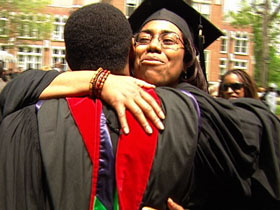
Mr. WALL: I don’t think it’s so much that we need to see young people, although that’s important. I feel like it’s more important that the church communicates to young people and make a point of that and show you are the future. We should invest in you and not bring you along as we go on our journey but equip you to go on yours.
Ms. BECKWITH: People say young people don’t read the Bible nowadays. I don’t agree with that. I think they read it, and they read it critically, and they have a lot of questions, and if these questions are not going to even be addressed or remotely addressed, then they are going to have issues.
VALENTE: Projects like the Fund for Theological Education are just beginning to have an impact on encouraging more bright young people to enter seminary. But it’s too early to tell how many of them will actually go into parish ministry. The Reverend Oak and others say they are convinced there are more young adults out there waiting to be tapped.
The Reverend OAK: The people that I have had an opportunity to work with have a deep passion for the well-being of the church, and that’s what gives me such hope that not only will these trends reverse, but the church will open up and change in ways that will embrace a lot of different people.
VALENTE: Especially the next generation of church leaders who received this rousing send-off from Dean Maxine Beach at Drew.
Dean BEACH (speaking to graduating class): Ready, able and worthy of the gift that God has given you, go out and make a difference. Amen.
VALENTE: For RELIGION & ETHICS NEWSWEEKLY, I’m Judy Valente in Madison, New Jersey.

